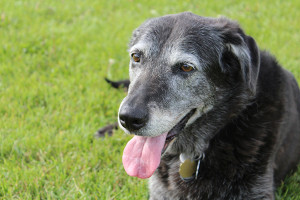
Call us Now ![]() +91-8744012053
+91-8744012053
Mon - Sat ~ 10:00 AM - 6:00 PM
Follow & Like
.png)


Call us Now ![]() +91-8744012053
+91-8744012053
Mon - Sat ~ 10:00 AM - 6:00 PM
Follow & Like
.png)


What is Canine Dementia?
An aging dog will most likely display behavior changes. Dementia, also known as cognitive dysfunction syndrome is characterized by aging of the canine brain. This affects your dog’s memory, learning ability, understanding and focus and responses. Dementia is connected to a decrease in Dopamine, a neurotransmitter.
The changes in your dog’s behaviour, physical appearance, appetite, sleep pattern and routine activities could be very small and subtle initially. Dog parents must watch their pets closely when they enter their senior phase. Seek your vet’s advice upon noticing any minor or major change in your pet’s conduct to rule out the presence of a medical problem before you blame cognitive dysfunction for the change/s.

The most distressing phase for a dog parent is seeing his/her fur baby slow down because of age and its related diseases. Deterioration of physical strength and loss of mental faculties are things your senior pooch cannot escape. Just as its in humans old age comes with a fair share of health related issues for your canine companion. Image:www.dogster.com
Common Symptoms of Cognitive Dysfunction Syndrome in Dogs:
The dog may find it hard to get to a certain location in its very own familiar home. For instance to get back inside the house from your backyard the pooch may stand in front of the wrong door. Also the pooch experiences a loss of spatial awareness.

Spatial awareness is the ability to be aware of oneself in a certain space and to be able to interact with its environment or objects placed close by. Loos of this sense in older Canines causes it feel stuck or lost behind a piece of furniture and an inability to come out of that position. Image: thriftyfun.com
The dog may stop responding to commands given out by its owner. If a hearing problem is ruled out, then it is a case of degeneration of the brain. The dog fails to process and react to a command the way it should. In later stages of this malady, it may also not be able to recognize/respond to its name.
Repetitive motions such as moving the head quickly down & up, walking in circles and shaking the legs are connected to Dementia.
 Sadly it is not possible to cure Dementia. It only gets worse as time progresses. However you can manage & slow down the consequences and symptoms with the help of a veterinarian to make your pet feel more comfortable & happy. The vet may advise dietary changes and inclusion of supplements to slow down the effects of aging and cognitive dysfunction.
Sadly it is not possible to cure Dementia. It only gets worse as time progresses. However you can manage & slow down the consequences and symptoms with the help of a veterinarian to make your pet feel more comfortable & happy. The vet may advise dietary changes and inclusion of supplements to slow down the effects of aging and cognitive dysfunction.
Antioxidants and Omega 3 fatty acids improve cognitive functioning and promote the health of cells. Talk to your pet’s doctor about relevant herbal cures and homeopathic treatments.
Daily activities you should try, to fight dementia:
It is important to stick to a daily routine of exercise and feeding. Do not go over-board with exercising the old four legged chap. To know how much exercise would be enough for the senior pet, you can consult the vet. Also do not re-arrange your pet’s personal things or other furniture in the house.
Introduce the senior to new tricks that will sharpen its mind.
Offering treat dispensing puzzle toys will provide sufficient mental stimulation to the pet dog along with rewarding it with its favorite delicacy.
Spend quality time with your dog and cosset it with your love.
Present it with opportunities to socialize with other friendly dogs. Cognitive decline can be slowed down by keeping the pooch mentally and physically active.
Regular check-ups at the vet’s clinic are important to keep a close watch on the condition and to deal with associated changes/problems. A vet may also prescribe medications for Dementia. The focus should be to improve the quality of your pet’s life in its golden years and suitably reward it for the loyal companionship it has bestowed upon you.
Article Resources:
https://iheartdogs.com/5-signs-of-dementia-in-dogs-how-you-can-help/
https://www.thespruce.com/senior-dementia-in-dogs-3385016